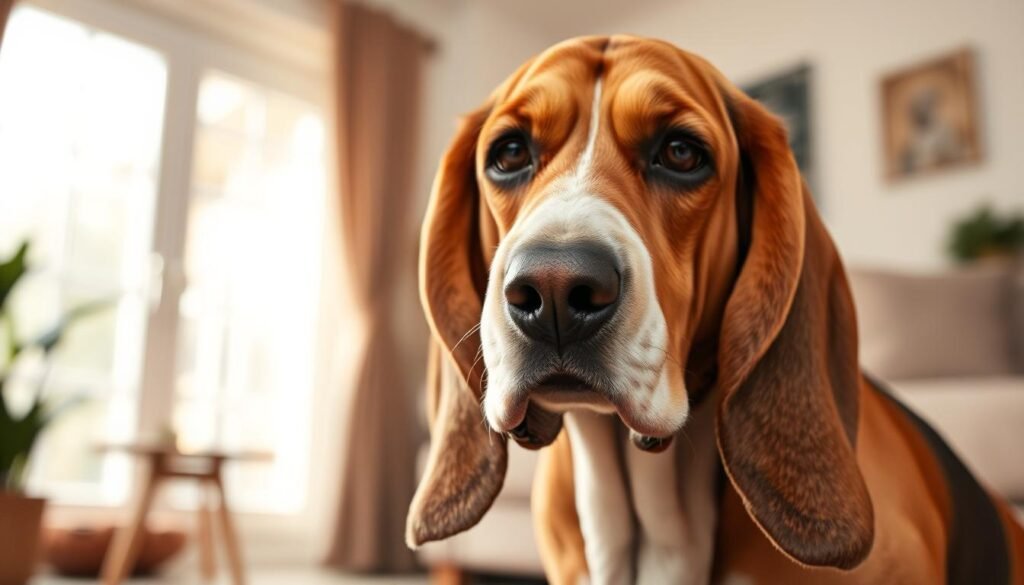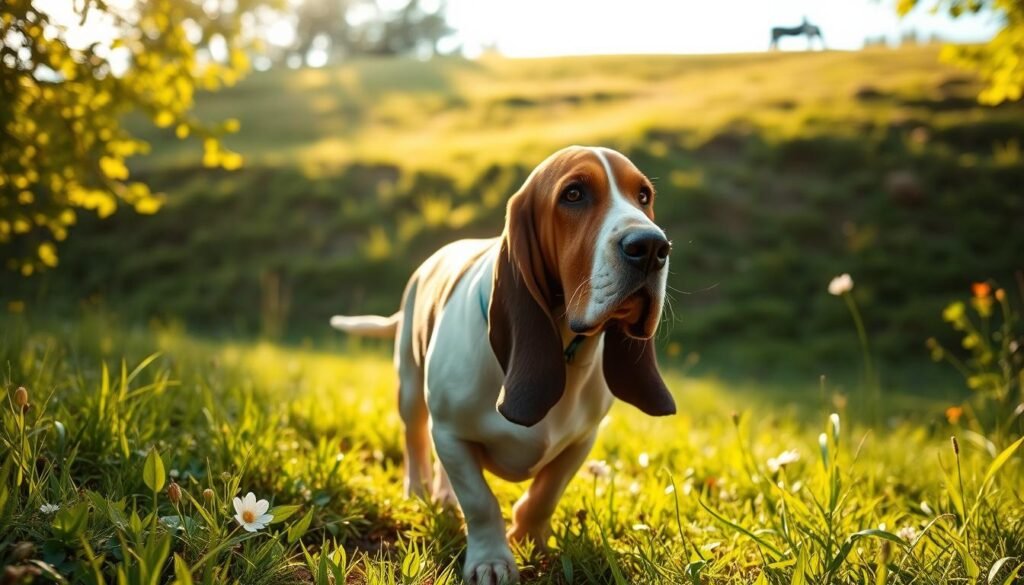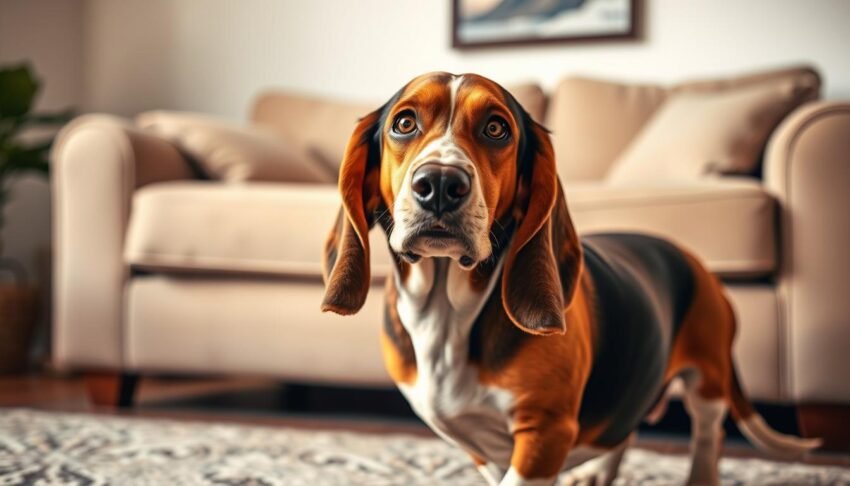As a Basset Hound owner, you’re likely familiar with the breed’s distinctive appearance and gentle nature, making them a beloved Hound dog and often referred to as a Droopy dog. With their short legs, long ears, and affectionate nature, Basset Hounds have won the hearts of many. Whether you’re a seasoned dog owner or a newcomer to the world of canine companions, this guide will provide you with the insights you need to understand and care for your Basset Hound.
According to the third web source, Basset Hounds are known for their distinctive appearance and gentle nature. As a Basset Hound owner, it’s essential to understand the breed’s specific needs, including their size, coat, personality, and health. Basset Hounds are a unique breed, and their characteristics make them a great companion for many families, and they are often considered a great Hound dog and a lovable Droopy dog.
Key Takeaways
- Understanding the Basset Hound breed is crucial for providing proper care and attention.
- Basset Hounds are known for their distinctive appearance and gentle nature, making them a beloved Hound dog and often referred to as a Droopy dog.
- Regular veterinary check-ups are vital for managing health issues associated with the breed.
- Basset Hounds require patience and positive reinforcement during training, as they can be prone to behavioral problems, including urination/defecation indoors1.
- With proper care and attention, Basset Hounds can thrive in apartment living due to their relatively low energy needs2.
Introduction to Basset Hounds
As a Short-legged dog, the Basset Hound is a unique breed with a rich history. Originating in France, Basset Hounds were bred for hunting, specifically for tracking small game3. Their short stature allowed them to follow scents close to the ground, while their long ears helped to sweep scents towards their nose. This brief history has shaped the breed into what it is today: a loving, gentle, and determined companion.
The Basset breed is known for its distinctive physical characteristics, including its short legs and long, droopy ears. But what makes them truly unique is their combination of physical characteristics, temperament, and history. According to historical records, the Basset Hound was recognized by the Kennel Club (England) in 1880, highlighting the establishment of breed standards4. The breed’s body composition includes up to 25% of their body weight made up of bone, which is proportionally the most of any breed4.
Some key characteristics of the Basset Hound include:
- Short legs, with males reaching 30–38 cm (12–15 in) in height and females reaching 28–36 cm (11–14 in)5
- A long, droopy ear structure that helps to sweep scents towards their nose
- A short, smooth coat that requires regular grooming
The Basset Hound is a beloved breed, known for its gentle and affectionate nature. With proper care and attention, they can make wonderful companions for active families or individuals. Whether you’re a seasoned dog owner or a first-time pet parent, the Basset Hound is definitely worth considering3.
Physical Characteristics of Basset Hounds
Basset Hounds are known for their distinctive physical appearance, which includes a long, low-set body and short, powerful legs6. Adults typically weigh between 40 and 65 pounds and stand up to 15 inches tall at the shoulder7. Their coat is short, dense, and comes in a variety of colors, including tricolor, red and white, and lemon and white. Understanding these physical characteristics is essential for appreciating the breed’s unique needs and requirements.
Some key characteristics of Basset Hounds include:
- Size: Medium to Large8
- Coat: Short, dense, and comes in various colors
- Weight: 40 to 65 pounds7
- Height: Up to 15 inches6
It’s essential to consider these physical characteristics when caring for a Basset Hound, as they can impact the dog’s health and well-being8. Regular grooming, exercise, and check-ups with a veterinarian are crucial to ensure the dog leads a happy and healthy life.
Personality Traits of Basset Hounds
As you consider bringing a Basset Hound into your family, it’s essential to understand their personality traits and how they impact Basset Hound care and Basset Hound training. Basset Hounds are known for their gentle, patient disposition, making them an excellent choice for families with children9. However, they can also be stubborn at times, requiring consistent, patient training9.
When it comes to socialization, Basset Hounds need early and frequent exposure to various environments, people, and animals to develop good manners and reduce the risk of behavioral problems9. With proper training and socialization, Basset Hounds can grow into well-behaved, loving companions. Their temperament is characterized by a calm demeanor, but they can also be quite determined when following a scent, showcasing their hunting heritage9.
Some key aspects of Basset Hound personality traits include:
- Gentle and patient, making them suitable for families with children9
- Stubborn at times, requiring consistent and patient training9
- Socialization needs: early and frequent exposure to various environments, people, and animals9
- Calm demeanor, but determined when following a scent9
By understanding these personality traits, you can provide the best possible Basset Hound care and Basset Hound training, helping your dog become a well-adjusted and loving companion99.
Health Considerations for Basset Hounds

As a Basset Hound owner, it’s essential to be aware of the potential health issues that can affect your pet. Basset Hound information and Basset Hound health are crucial in ensuring your dog leads a happy and healthy life. Regular health checkups are vital in detecting any potential health problems early on10. According to the Basset Hound Club of America, Basset Hounds require at least one walk daily, and their average lifespan is around 12-13 years10.
Some common health issues that can affect Basset Hounds include skin and ear infections, hip dysplasia, and intervertebral disc disease11. It’s also important to monitor your dog’s weight, as obesity can lead to various health problems, including back issues and joint pain12. A balanced diet and regular exercise can help prevent these issues. Here are some key health considerations for Basset Hounds:
- Skin and ear infections: Regular cleaning and checking of skin folds and ears can help prevent infections12.
- Intervertebral disc disease: This condition can lead to paralysis if left untreated, so it’s essential to monitor your dog’s back health11.
- Obesity: Maintaining a healthy weight through a balanced diet and regular exercise can help prevent obesity-related health issues10.
By being aware of these potential health issues and taking steps to prevent them, you can help your Basset Hound live a long and healthy life. Remember to always consult with a veterinarian for personalized advice on Basset Hound health and care10.
Training Your Basset Hound
When it comes to Basset Hound training, patience and positive reinforcement are key13. As a Hound dog owner, you’ll want to focus on creating a consistent training schedule that incorporates rewards and praise. This approach will help your Basset Hound become a well-behaved and loving companion.
Effective training techniques for Basset Hounds include socialization training, which helps your dog become confident and calm in new environments13. You can achieve this by exposing your Basset Hound to various people, dogs, and situations from an early age. Additionally, crate training and leash training are essential for any Hound dog owner13.
Some important tips to keep in mind when training your Basset Hound include:
- Be consistent and patient, as Basset Hounds can be stubborn at times13
- Use positive reinforcement techniques, such as treats and praise, to encourage good behavior13
- Avoid punitive measures, such as yelling or hitting, as they can be counterproductive13
By following these tips and incorporating effective training techniques, you can help your Basset Hound become a well-behaved and loving companion13. Remember to always prioritize positive reinforcement and patience, and you’ll be well on your way to successful Basset Hound training.
Nutrition for Basset Hounds
As a Basset Hound owner, providing the right nutrition is crucial for the health and well-being of your pet. Basset Hound care involves understanding the nutritional needs of the Basset breed, which can be prone to obesity and other health issues if not fed properly14. A balanced diet that meets the nutritional needs of your Basset Hound is essential to prevent health problems and ensure a long and happy life.
When it comes to feeding your Basset Hound, it’s essential to choose a high-quality dog food that is rich in protein and fiber, and low in fat15. Adult Basset Hounds require a daily caloric intake of 1200 to 1500 calories, while puppies need more frequent, smaller meals to match their energy needs during rapid growth15. It’s also important to establish a regular feeding schedule to prevent overeating and maintain a healthy weight.
Some of the best foods for Basset Hounds include those that are rich in omega-3 fatty acids, which can help improve joint health and alleviate inflammation15. It’s also important to avoid foods that are toxic to dogs, such as chocolate, grapes, onions, garlic, and artificial sweeteners like xylitol15. By providing a balanced and nutritious diet, you can help keep your Basset Hound healthy and happy.
- Choose a high-quality dog food that is rich in protein and fiber, and low in fat15
- Establish a regular feeding schedule to prevent overeating and maintain a healthy weight14
- Avoid foods that are toxic to dogs, such as chocolate, grapes, onions, garlic, and artificial sweeteners like xylitol15
- Consider adding supplements, such as omega-3 fatty acids, to support joint health and alleviate inflammation15
By following these tips and providing a balanced and nutritious diet, you can help keep your Basset Hound healthy and happy16.
Grooming Your Basset Hound
As a Basset Hound owner, you know that grooming is essential to prevent health issues and strengthen the bond between you and your dog. Basset Hound information suggests that regular grooming sessions can help reduce shedding and prevent skin irritation17. When it comes to grooming your Droopy dog, it’s crucial to focus on bathing, brushing, nail care, and ear cleaning.
To keep your Basset Hound clean and healthy, consider the following grooming tips:
- Bathe your Basset Hound every 2-3 months, or more frequently if needed17
- Brush your Basset Hound’s coat weekly to control shedding and promote hair regrowth18
- Trim your Basset Hound’s nails monthly to prevent overgrowth17
- Clean your Basset Hound’s ears bi-weekly to prevent infections17
Regular grooming can help prevent health issues and strengthen the bond between you and your Basset Hound. By following these tips and using the right grooming tools, you can keep your Droopy dog clean, healthy, and happy18.
Exercise Needs of Basset Hounds

As a Short-legged dog, Basset Hounds have moderate energy levels and require daily walks to stay healthy and happy19. Regular exercise is essential for preventing obesity, which is common in Basset Hounds due to their love of food and tendency to be less active19. Adequate exercise helps maintain joint health, particularly to prevent issues like hip dysplasia, which is prevalent in the breed19.
When it comes to Basset Hound care, exercise is a crucial aspect. Adult Basset Hounds should have a routine that includes daily walks and opportunities for scent work19. Exercise sessions can be broken up into shorter intervals, particularly in hot weather or for senior dogs19. It’s essential to adjust exercise routines based on seasonal changes to avoid overheating in the heat and ensure adequate movement in cooler climates19.
Some safe activities for Basset Hounds include leisurely strolls, tracking, and nose work competitions, which provide mental stimulation without high impact on their joints19. Engaging activities for mental stimulation can also include scent games, puzzle toys, and trick training, which capitalize on their natural tracking abilities19. By providing the right balance of exercise and rest, you can help your Basset Hound lead an active, fulfilling life.
Choosing the Right Basset Hound
When it comes to choosing the right Basset Hound, there are several factors to consider. As you research Basset Hound information, you’ll want to think about your lifestyle and what kind of companion you’re looking for. The Basset breed is known for being relatively low-maintenance, but they still require regular care and attention20. For example, Basset Hounds have a notably low activity level and can happily snooze for several hours a day20.
One important decision is whether to adopt from a rescue organization or purchase from a breeder. Both options have their pros and cons, and it’s essential to find a reputable source. Look for a Basset Hound that is well-socialized, healthy, and has a temperament that fits your lifestyle. You’ll also want to consider factors like weight range, which typically spans from 45 to 70 pounds, with average adult Basset Hounds around 65 pounds20.
Here are some key things to consider when choosing a Basset Hound:
- Temperament: Basset Hounds are known for being friendly and outgoing, but they can be stubborn at times21.
- Health: Basset Hounds are prone to certain health issues, such as ear infections and joint problems20.
- Energy level: Basset Hounds have a relatively low activity level, but they still need regular exercise to stay happy and healthy20.
By doing your research and finding a reputable source, you can find the perfect Basset Hound companion for you and your family. Remember to consider factors like Basset Hound information and the Basset breed’s specific needs and characteristics21.
Living with a Basset Hound
As you welcome a Basset Hound into your home, it’s essential to consider their physical needs and create a Basset-friendly environment. Basset Hounds are well-suited to apartment living due to their moderate energy levels. To ensure a comfortable living space, provide a comfortable place to rest and protect their long backs from strain.
When it comes to household management, there are several tips to keep in mind. Here are a few:
- Secure toxic substances and fragile items to prevent accidents.
- Provide regular exercise and mental stimulation to keep your Basset Hound happy and healthy.
- Consider investing in a comfortable dog bed to support your Basset Hound’s joints.
As a responsible Basset Hound owner, it’s crucial to prioritize their care and well-being. By following these household tips and providing proper Basset Hound care, you can create a happy and healthy home for your Hound dog22. Remember to also consider their socialization needs and provide regular training to ensure a well-behaved companion23.
Fun Activities with Your Basset Hound
As a Basset Hound owner, you’re likely looking for ways to keep your furry friend entertained and engaged. With their unique personality and physical characteristics, Basset Hounds require activities that cater to their needs. According to24, average adult dogs need at least 30 minutes of rigorous game time per day to stay happy and healthy. This can include outdoor activities like walks and hikes, which provide physical exercise and mental stimulation.
In addition to outdoor activities, interactive games and toys are essential for challenging your Basset Hound’s mind and preventing boredom. You can try activities like “Fetch” and “Frisbee”24, or create an obstacle course using household objects24. These activities promote both mental and physical exercise, while also enhancing the bond between you and your Basset Hound. For example, the American Kennel Club (AKC) offers events for dogs enrolled under the Purebred Alternative Listing (PAL) program25, which enables participation of unregistered Basset Hounds in agility trials, obedience trials, and other events.
Some fun activities to try with your Basset Hound include:
* Scent work, which utilizes their keen sense of smell24
* Agility training, which involves skills like jumping and weaving25
* Obedience training, which requires dogs to perform specific commands25
* Interactive puzzle toys, which challenge their problem-solving skills
Remember to always consult with a veterinarian before increasing your Basset Hound’s daily activity level24. With a little creativity and patience, you can create a variety of fun and engaging activities for your Basset Hound, strengthening your bond and ensuring they lead a happy, fulfilling life. By incorporating Basset Hound information and understanding the Basset breed, you can tailor activities to meet their unique needs and personality traits.
Conclusion: Embracing Basset Hound Life
As you reach the end of this comprehensive guide, it’s clear that the Basset Hound is a breed that offers a truly special and rewarding companionship. These loyal, affectionate dogs are known for their gentle nature, making them an appealing choice for seniors who may live alone and seek emotional support26. With their moderate exercise needs and minimal grooming requirements, Basset Hounds can adapt well to a variety of living situations, including apartment life, though their vocalizations may be a consideration in multi-unit dwellings27.
To ensure a happy and healthy life for your Basset Hound, it’s crucial to provide proper training, socialization, and a balanced diet. While they can be stubborn during training, patience and consistency are key to overcoming any challenges27. Additionally, regular veterinary check-ups are essential to address common health concerns, such as hip dysplasia, ear infections, and obesity2627.
Embracing the Basset Hound lifestyle means appreciating their unique characteristics and catering to their needs. By doing so, you’ll be rewarded with a lifetime of loyal companionship, cherished memories, and the joyful presence of these beloved “droopy dogs.” Whether you’re considering adopting a Basset Hound or are already the proud parent of one, the resources and information in this guide will help you navigate the journey and ensure a fulfilling experience for both you and your canine companion.
FAQ
What makes Basset Hounds unique?
What is the history of the Basset Hound breed?
What are the typical physical traits of Basset Hounds?
What is the temperament of Basset Hounds?
What are some common health issues in Basset Hounds?
How should Basset Hounds be trained?
What should I consider when choosing a Basset Hound?
How can I create a Basset-friendly home?
What fun activities can I do with my Basset Hound?
Source Links
- Basset Hound 101: Owner’s Guide – https://gratefulpaw.com/basset-hound-training
- Basset Hound | Basset Hound Dogs & What They Were Bred For – https://www.embracepetinsurance.com/dog-breeds/basset-hound
- Introduction – https://www.basset.net/threads/introduction.55125/
- No title found – https://www.akc.org/expert-advice/dog-breeds/basset-hound-history/
- Basset Hound – https://en.wikipedia.org/wiki/Basset_Hound
- Basset Hound Breed Guide: Characteristics, History & Care – https://www.pawlicy.com/blog/basset-hound-dog-breed/
- All About the Floppy, Lovable Basset Hound – https://www.thesprucepets.com/basset-hound-breed-profile-4795766
- Basset Hound Dog Breed Information & Characteristics – https://dogtime.com/dog-breeds/basset-hound
- The Basset Hound – https://www.dogster.com/dog-breeds/basset-hound
- Basset Hound – https://www.petmd.com/dog/breeds/basset-hound
- Breed Info – Langston Animal Hospital – https://langstonanimalhospital.com/client-resources/breed-info/basset-hound/
- 7 important questions to ask before adopting a Basset Hound – https://www.countryliving.com/uk/wildlife/dog-breeds/a41038739/basset-hound/
- How to Train a Basset Hound: 5 Tips and Tricks – Dogster – https://www.dogster.com/dog-training/how-to-train-a-basset-hound
- Best dog food for basset hounds – Basset Hound World – https://www.bassethoundworld.com/best-dog-food-for-basset-hounds/
- Basset Hound Diet: Nutrition & Health – Basset Hound World – https://www.bassethoundworld.com/basset-hound-diet-nutrition-health/
- Basset Hound Feeding Guide – https://www.prodograw.com/raw-feeding-guide/basset-hound-feeding-guide/
- The Big Basset Hound Grooming Guide – Basset Hound World – https://www.bassethoundworld.com/the-big-basset-hound-grooming-guide/
- Care for the Basset Hound, Brushing, Bathing, and Haircut – https://artero.com/uk/petcare/breeds/basset-hound
- How Much Exercise Does a Basset Hound Need? – https://iheartdogs.com/how-much-exercise-does-a-basset-hound-need/
- The Right Dog for You? – https://basset-bhca.org/find-a-basset/the-right-dog-for-you/
- What else should I consider? – https://basset-bhca.org/find-a-basset/what-else-should-i-consider/
- Basset hound is the perfect family pet | Life Happens – https://gazette.com/thetribune/basset-hound-is-the-perfect-family-pet-life-happens/article_c7765d3c-9a68-11ec-8c9a-f3c2f94a8029.html
- Is a Basset Hound right for me ? – https://www.petforums.co.uk/threads/is-a-basset-hound-right-for-me.298519/
- 6 Types of Fun Games to Play with Your Hound – Taste of the Wild Pet Food – https://www.tasteofthewildpetfood.com/grooming-care/6-types-of-fun-games-to-play-with-your-hound/
- Companion Events – https://basset-bhca.org/events-programs/companion-events/
- Are Basset Hounds Good for Seniors? – Basset Hound World – https://www.bassethoundworld.com/are-basset-hounds-good-for-seniors/
- Basset Hound: Embrace The Loving Nature Of This Lovely Breed – https://bonevoyagedogrescue.com/scent-sational-world-of-basset-hounds/


